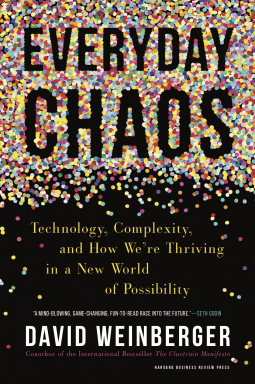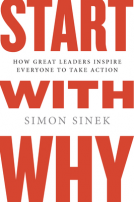
Everyday Chaos
Technology, Complexity, and How We’re Thriving in a New World of Possibility
by David Weinberger
This title was previously available on NetGalley and is now archived.
Send NetGalley books directly to your Kindle or Kindle app
1
To read on a Kindle or Kindle app, please add kindle@netgalley.com as an approved email address to receive files in your Amazon account. Click here for step-by-step instructions.
2
Also find your Kindle email address within your Amazon account, and enter it here.
Pub Date May 14 2019 | Archive Date May 30 2019
Talking about this book? Use #EverydayChaos #NetGalley. More hashtag tips!
Description
Make. More. Future.
Artificial intelligence, big data, modern science, and the internet are all revealing a fundamental truth: The world is vastly more complex and unpredictable than we've allowed ourselves to see.
Now that technology is enabling us to take advantage of all the chaos it's revealing, our understanding of how things happen is changing--and with it our deepest strategies for predicting, preparing for, and managing our world. This affects everything, from how we approach our everyday lives to how we make moral decisions and how we run our businesses.
Take machine learning, which makes better predictions about weather, medical diagnoses, and product performance than we do--but often does so at the expense of our understanding of how it arrived at those predictions. While this can be dangerous, accepting it is also liberating, for it enables us to harness the complexity of an immense amount of data around us. We are also turning to strategies that avoid anticipating the future altogether, such as A/B testing, Minimum Viable Products, open platforms, and user-modifiable video games. We even take for granted that a simple hashtag can organize unplanned, leaderless movements such as #MeToo.
Through stories from history, business, and technology, philosopher and technologist David Weinberger finds the unifying truths lying below the surface of the tools we take for granted--and a future in which our best strategy often requires holding back from anticipating and instead creating as many possibilities as we can. The book’s imperative for business and beyond is simple: Make. More. Future.
The result is a world no longer focused on limitations but optimized for possibilities.
Available Editions
| EDITION | Other Format |
| ISBN | 9781633693951 |
| PRICE | $30.00 (USD) |
| PAGES | 256 |
Average rating from 5 members
Featured Reviews
Everyday Chaos is a breathe of fresh air in a world of increasing complexity. Written in a philosophical point of view, this book tackles a myriad of topics like machine learning, justice, history, how different systems work with each other (interoperability), creativity, and meaning. This book does a remarkable job of marshalling all these ideas to create a compelling picture of the world we are living in.
This book is deep and practical at the same times. There are many occasions that it is funny as well. David Weinberger writing skills will take you to a fun, intellectual, and eye-opening journey in our complex world.
This book will appeal to those who are looking to read something intellectually enriching about the topic that touches everyone today.
I definitely misunderstood the scope of the book, but I found it fascinating nonetheless. There’s a little bit of everything in here and it’s all written well.
 Librarian 431790
Librarian 431790
I could use a lot of adjective and words to define this book: fascinating, engaging, entertaining, and food for thought. What it really matters is that this is one of the best book I read that try to explain the complexity of the world we're living and the new issues we're facing.
I loved how the writer organized the book and the clarity of the explanations as well as it makes you reflect on the different theories.
A fascinating read, highly recommended!
Many thanks to Harvard Business Review Press and Netgalley for this ARC, all opinions are mine.
 David W, Media/Journalist
David W, Media/Journalist
Everyday Chaos is an instantly excellent book. Right in the introduction, David Weinberger provokes you with: “The true complexity of the world far outstrips the laws and models we devise to explain it.” Enlarging on this, he digs the hole deeper: “At least since the ancient Hebrews, we have thought ourselves to be the creatures uniquely made by God with the capacity to receive his Revelation of the truth. Since the ancient Greeks, we’ve defined ourselves as the rational animals who are able to see the logic and order beneath the apparent chaos of the world.” We put ourselves on a pedestal, and worshipped.
Basically, we not only don’t know what we don’t know, we don’t understand what we think we know. The inescapable conclusion is - you must read on.
Every so often, our neatly ordered world is buffeted by some scientist/philosopher who says it’s not what you think. And it’s not why you think and not how you think it. It operates differently, for different reasons, different causes, with different relationships and outcomes. Newton, Einstein and Galileo performed these roles, changing the course of thought and action forever. Now, it seems Weinberger looks to artificial intelligence (AI) to take on that role.
His first and best example is a healthcare learning monster called Deep Patient. The Deep Patient project fed a computer with hundreds of data points for every one of 700,000 patients and let it figure out what it could, without restrictions. This is called deep learning, and results in findings humans never considered or could even imagine. It made diagnoses and predictions that were way outside the box for the medical fraternity, and were reliable. The lesson from Deep Patient is that deep learning systems do not have to simplify the world to what humans can understand, he says.
The book is very tight. Weinberger has it highly organized, as the ancient Greeks would have appreciated. He is easy to follow, entertaining along the way and provides an intriguingly different perspective on the way of the world. Can’t ask for much more.
Backing off to basics, Weinberger shows what Man does is anticipate. He loves to understand all the possibilities in advance, and prepare for them. Machines don’t have those blinders on. They operate in unanticipation, where anything is possible given the data that shows it. They let the data instruct them. No hypotheses are necessary. It goes against everything we’ve built to date.
This is the kind of analysis and exploration that pervades the book. It is a pleasure of discovery. It is a revelation to watch as he puts the puzzle pieces together. That he does it with humor is a delightful bonus.
In a discussion of programming AI, he hits on the ugly problem of decisions in an emergency. What is fair? What is appropriate? What will minimize the negative outcome? Who get to decide? The machine will do what we program it to do. He says: “Machine learning systems are profoundly nonmoral. They are just machines, not Just machines.”
We show our insecurity and ignorance by insisting that machines explain themselves to us. We insist on knowing how they came to their result. We want accountability for self-learning we cannot understand. We hold the machines to higher standards than we do for humans. Years ago, Google said it could not alter the objectionable results its search engine produced, because they didn’t understand how it got them. Algorithms are black boxes, and just because we couldn’t have come to the same answers, doesn’t mean we need to be able to parse every move to get to them. It wouldn’t help us.
Animal scientist Frans de Waal criticizes his peers for conducting biased tests on animals, somehow always proving than Man is a superior animal. David Weinberger is doing much the same thing between AI and Man. Until and unless we stop trying to instill the values of Man into machines, the machines will never achieve their potential. They will usher in dystopia instead of providing the answers we would never have considered on our own.
Weinberger says we have come to the point where we see “the world as further beyond our understanding than we’ve let ourselves believe.” It’s an update to Herbert Stein’s famous “The more I seem to know, the less I seem to know.” Everyday Chaos is the right book for this moment.
David Wineberg
Readers who liked this book also liked:
John Kotter; Holger Rathgeber
Business, Leadership, Finance, Nonfiction (Adult)


















